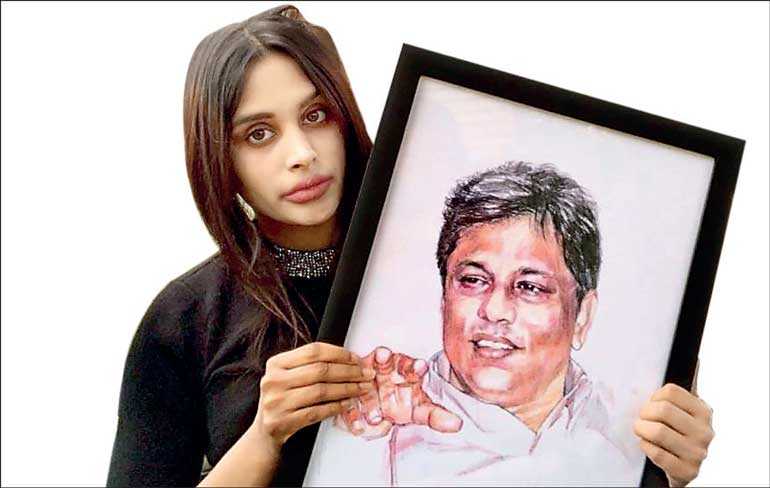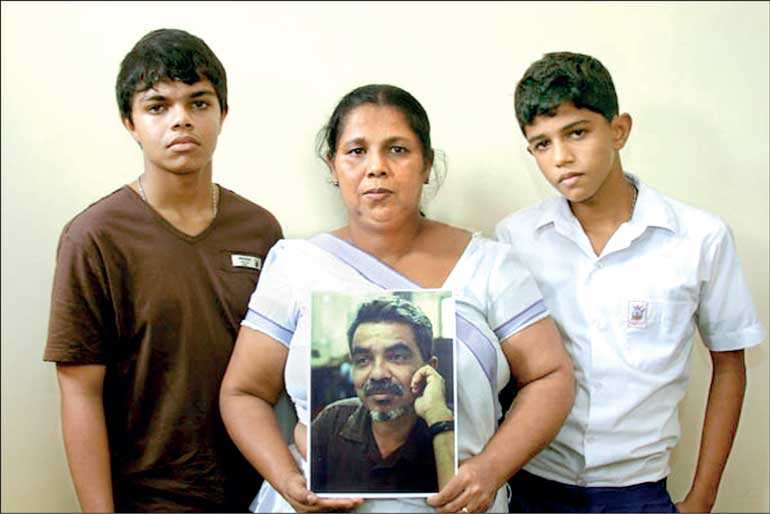Friday Feb 13, 2026
Friday Feb 13, 2026
Friday, 19 April 2019 00:00 - - {{hitsCtrl.values.hits}}


In this article, I intend to discuss the serious wounds inflicted on the psyche of Sri Lankan society, which have not received adequate attention, but need immediate cure, for they might develop into a dangerous cancer if not treated without further delay. I feel it is apt to begin this analysis from the action filed against Gotabaya Rajapaksa in the Courts of Los Angeles, California, USA by the daughter of Lasantha Wickrematunge. 
Lasantha Wickrematunge, who can be considered an eminent newspaper editor of Sri Lanka, was murdered in a most ruthless and cruel manner in broad daylight within a high security zone in Colombo.
By the time Lasantha was assassinated, two of his three children were very small. Only the elder daughter was 17 years old. They couldn’t do anything but moan for their father who was killed. Though 10 years have lapsed since his assassination, which received wide international attention, Sri Lanka has failed to implement the law against the perpetrators of the crime.
Perhaps those who were responsible for this crime might have believed that it would be forgotten with the passage of time. But, from the recent case filed against Gotabaya Rajapaksa in the USA, it is now evident that Lasantha’s children have not forgotten the assassination of their father and that they have taken the onus of the legal struggle of his assassination.
There are at least a few who would not easily forget crimes when one among them is assassinated. These few people can be considered as the amber in the ashes.
Abductions and disappearances
This trend can be explained even in terms of the disappearance of Prageeth Eknaligoda, journalist, cartoonist and a political analyst. Though the Criminal Investigations Department, following its investigations had established the disappearance of Eknaligoda was a crime committed with the knowledge of the Intelligence Unit of the Army and reported it to the Judiciary, the investigators in charge of this case have been compelled to pursue their investigations in the midst of distractions and prohibitions as the sympathy of the rulers of this country seems to have focused on those responsible for the crime more than its victims.
Even though more than nine years have lapsed since the incident of abduction and disappearance of Eknaligoda, for some unknown reasons, so far, it has not been possible to mete out justice to Eknaligoda. The responsibility of ensuring justice to him had to be shouldered by his wife Sandya Eknaligoda. Despite it being her inalienable right and while she deserves the sympathy of society as a whole, it is rather unfortunate that she is faced with enormous allegations and insults. How will all these outrageous insults affect her children?
The abduction of 11 youth to obtain ransom and kill them later is another tragic incident that can be cited to explain the situation I am analysing here. The list of 11 youth missing is as follows:
1Kasturi Arachchige John Reid, No.38/28 Ratnam Road, Kotahena
2Thyagaraja Jegan No. 42, Liyanagar, Trincomalee
3Rajeev Naganadan, No. 87, Shu Road , Kotahena
4Suseyi Pulle Achalan Leon, No.47/0, Arippu East,Arippu
5Suseyi Pulle Rohan Stanley Leon, No.47/0, Arippu East,Arippu
6Kasturi Arachchige Anton, No.38/28 Ratnam Road, Kotahena
7Sugath Vishvanadan, No.1/6/220, Wasala Road ,Colombo 13
8Nilakeshwaran Ramalingam, No. F12, Blumendhal Flats
9Mohamed Dilan Jamaldeen, No. 75/12, Dematagoda, Colombo 9
10Mohamed Saapin, No.40 , Dematagoda, Colombo 9
11Ali Anver alias Hajjiyar, No. 27/40, Fernando Road, Karagampitiya
The Criminal Investigations Department initiated this investigation following a complaint by Admiral Wasantha Karannagoda, the Commander of Navy during the rule of President Mahinda Rajapaksa, to the CID on 19 May 2109 against his Personal Security Officer, then Lieutenant Commander Nilantha Sampath Munasinghe, who was in charge of the Security Reserve. 
The Criminal Investigations Department, consequent to their investigations, revealed that Lieutenant Commander Nilantha Sampath Munasinghe, with the support of several others in the Navy, had detained the 11 youth abducted in a building called Pittu Bambuva, at Chaithya Road, Colombo Fort, which originally belonged to the Department of Emigration and Immigration and had been later used by the Sri Lanka Navy.
Later, the abducted youths had been transferred to Trincomalee and were detained at the underground prison cells known as gun-sites at the Trincomalee Navy Base; subsequently, they were killed from time to time while being detained there and their bodies were dismembered and dumped in the sea.
Even in this gruesome incident, the sympathy of the authorities is on the people connected with the crime and not the 11 families who were victims. The Criminal Investigations Department has so far been able to pursue their investigations irrespective of various influences coming their way, but it is not clear how long this situation will prevail. Though more than 10 years have lapsed since the investigations into this incident commenced, so far no justice has been meted out to the affected families. The parents, brothers and sisters of the families of victims must be having great frustration about Sri Lanka, its State and the Government.
Similarly, if a list is prepared of those who were victims of assassinations and disappearances during the period in which the country was afflicted with violent struggles and were deprived of justice, unavoidably, it would become a lengthy document. The names of MP Raviraj and media person Sivaram (Taraki) who were assassinated during the reign of Mahinda Rajapaksa, Rohana Kumara, the Editor of Satana newspaper, and Kumar Ponnambalam assassinated during the reign of Chandrika Kumaratunga too, should be included in this list. Similarly, when the innocent people who became victims of assassinations during Tamil Elam war, ’83 black July and two JVP insurrections are included in this list, inevitably it will become a very long and massive document.
This problem is relevant not only to the innocent people who were killed. Even the members of the families of those who had actually involved in the subversive activities and got killed too can have grievances and unrest about the death of their family members. They must be feeling that their desirables had been killed unjustly.
Apart from this, there is a large number of people who escaped death but had been grievously tortured and tormented. Moreover, there is a very large section of people who have been disabled, widowed, deprived of their property and traditional lands and displaced from their native villages. It may be possible that psychologically all of them are sick one way or the other due to post traumatic stress, internal tensions and conflicts.
This, being a pathological situation, may have contributed one way or the other to distort the social psyche of Sri Lanka. It would not augur well for the country to leave the distorted social psyche of Sri Lanka to remain in a sick and festering state. It is important that Sri Lanka should make a serious attempt to develop deliberate policies and implement them soon and restore the distorted social psyche into its normal form.
Rebels and the security forces
The security forces performed an important role in defeating Sinhala and Tamil rebellions. Even though the situation that prevails in the country at present is not satisfactory, it would have been worse if the Sinhala and Tamil rebels had been successful or they were allowed to pursue their struggles up to now. Therefore, society should be happy for being able to defeat the rebellions and conclude the internal war.
But we must not forget that the society and State had to pay a bigger price to defeat the rebellions. There was a big increase in the number of security forces and the country had to incur an enormous cost to maintain the security forces which was not affordable. Now, even in the absence of a war, the country has been compelled to maintain a large security force which is not affordable. It can be said that it has become a heavy economic burden for the country.
During the period in which there were rebellions and an internal civil war, politicians received the support of criminal elements for their protection. They established private armies consisting of criminals providing them with weapons and training them in the use of weapons. This resulted in creating an atmosphere in which the politicians were dependent on the support of the criminal elements while criminal elements were dependent upon politicians.
The mutual interdependence between politicians and the criminal elements created an atmosphere of disorder and lawlessness in the country to a greater extent. This situation had impacted on the police and the armed forces as well. A certain section of the deserters of armed forces and those of the former rebel groups joined the underworld, causing a big growth in the underworld and a rapid increase in the crime rate.
When there were rebellions and internal wars, both rebels and security forces exerted maximum violence and cruelty on society in their battle against each other. The security forces were successful in subduing both Sinhala and Tamil rebels as they were able to released more violence and cruelty than was exerted by the rebels themselves. This situation led to weaken not only the psyche of the society but also the psyche of the security forces.
Though the people went to the extent of extolling the armed forces as the heroes who saved the country at the last war in which the LTTE was defeated, they did not go to the extent of treating the same army as heroes when they defeated the JVP. By that time, Sinhalese people had a big criticism as well as a big opposition for the security forces.
Though the security forces were able to defeat the Sinhala and Tamil rebels, these rebellions caused serious damage to the State and the security forces. Therefore, following the defeat of rebellions the State had become weak and reached the verge of a failing state.The recognition earned by the security forces among the Sinhalese people of the country following the victory of the internal war, had caused to deprive the State of its ability to implement the law against those members of the security forces who had committed serious offences during the war. This situation has led to create conflicts and confusion in the country.
Political parties and morality
On the other hand, the violent rebellions had caused a serious deterioration in moral values of all political parties. During the times of the JVP insurrections, the UNP which was in power then followed a policy of assassinating rebels for their protection. Besides that, they had adopted a policy of getting the supporters of the other opposition parties who had no connections whatsoever with the JVP assassinated for election advantages.
At the initial stages of the JVP insurrection, the SLFP adopted a policy of supporting the JVP through informal means with the view to gaining undue political advantages and ensuring their protection. Later, the JVP adopted a policy of attacking the SLFP when it failed to persuade the latter to refrain from contesting the 1988 presidential election. Along with that, the leaders of the SLFP vehemently supported the program launched by the UNP Government to suppress the JVP.
After the JVP was defeated, Hamilton Wanasinha, the Chief Commanding Officer of the Sri Lanka Army, in an interview with the Daily Mirror on 9 October 1998 had explained certain matters discussed at a meeting of security chiefs, during the final phase of the suppression of the JVP rebellion, which was attended by the leaders of other political parties as well.
President Ranasinghe Premadasa and SLFP Leader and Opposition Leader Sirimavo Bandaranaike were also present at that meeting. According to Wanasinha, Bandaranaike had stated: “You may take any step and suppress the insurrection as soon as possible.” In view of this, it can be said that two major political parties worked jointly as active partners of the program launched to suppress the JVP insurrection.
In addition, the leftist parties also had to abandon their anti-UNP stand and act as enthusiastic supporters of the program launched for suppressing the JVP insurrection. As the JVP had adopted a policy of killing all political opponents, all leftist political parties, leftists ideological movements and former JVPers who had deserted the party were compelled to support and work with the war strategy of the Government and the security forces, as direct or indirect partners of the program. When Eelam war was in progress in the north, things happened in a similar way. All other political parties in the north were compelled either to support the war strategy of the LTTE or the counter strategy of the Government launched against the LTTE.Thus, all political parties in Sri Lanka, directly or indirectly, can be said to have contributed to the large-scale bloodshed that occurred in the country. It is not only the hands of the JVP and the LTTE that are stained with blood. All political parties have their hands stained with blood. By that it can be said that all political parties have lost their political legitimacy. The moral deterioration caused in the political parties by this situation can be considered an important factor that had affected the decay and the putrefaction of the political psyche of Sri Lanka.
This situation can be considered a complex phenomenon which has overwhelmed society as an entirely. Addressing this situation which had led to
distort and weaken society is one of the serious challenges facing Sri Lanka.